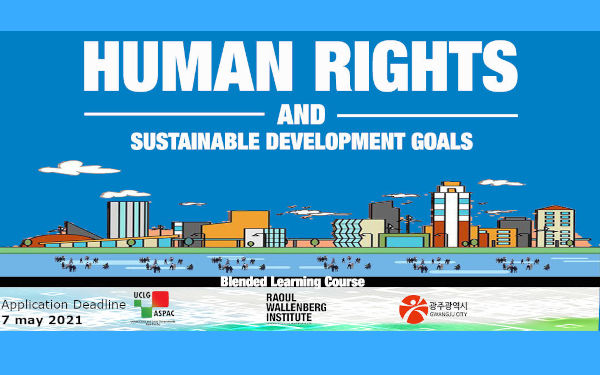JOIN US at BLENDED LEARNING COURSE (BLC)

Background
Local governments play a key role in realising both sustainable development goals and human rights. Specifically, the linkages between human rights, local government, and SDGs was described well in the United Nations High Commissioner for Human Rights Resolution of A/HRC/39/L.8[1], which adopted a comprehensive, far-reaching and people-centred set of universal and transformative Sustainable Development Goals and targets, committed to work tirelessly for full implementation of the Agenda by 2030 at all levels, and underscored the significant contribution that local government can make to the implementation of the Sustainable Development Goals and their targets. The UN Human Rights Council Advisory Committee on Local Government and Human Rights (A/HRC/30/49) also identified that a human rights city idea is one of the globally developed initiatives among plenty of globally initiatives in localising human rights. Davis F.M et.al (2018)[2] reported that human right city is the most effective and ready to use tools to achieve the SDGs, which among other as noted by the Gwangju Declaration[3] is the right of all citizens to fully participate in decision-making and policy-implementation processes. Participation is a key requirement for ensuring “no one left behind” as committed by the Members States of the UN when adopting the 2030 Agenda, the Sustainable Development Goals (SDGs).
The importance of engaging local governments in promoting human rights in the SDGs process has driven UCLG ASPAC and RWI with the support of Gwangju Metropolitan City to initiate a course called Blended Learning Course in 2018. The main target participant is UCLG ASPAC members. This year is the 3rd Blended Learning Course and RWI and UCLG-ASPAC have agreed to improve local government’s capacity mainly on the following aspects:
- Understanding human rights-based approach;
- Building capacity to ensure rights-based perspective is applied in SDGs implementation;
- Identifying researchers and practitioners to provide academic expertise and inform on research-based lessons learned.
RWI, UCLG ASPAC and City of Gwangju will conduct an online workshop to introduce the BLC program, and topics to be discussed throughout the program. It will also be enriched by the participation at selected sessions in the annual event of the World Human Rights Cities Forum (WHRCF).
Objectives
Specific objectives of the course are:
- Increased opportunities for key stakeholders to network and exchange knowledge and experience on localizing human rights and environment in the context of SDGs.
- Improved knowledge and skills among targeted individuals on how to respond to and localize human rights, gender equality, and environment of the context of achieving SDGs.
- Increased availability of publications, research products, teaching resources, and training modules on topics related to localizing human rights and environment in the context of SDGs.
Topics of the Course
- Introduction to Human Rights;
- Human Rights Mechanism: Monitoring & Enforcement;
- Human Rights and SDGs; and
- Human rights-based recovery and urban resiliency.
- Case studies from selected cities/human rights cities to be embedded into each module to illustrate key message from each module.
Methodology
The course will be delivered online through seminars (launching and closing), online course, course project, and online consultation.
Application Process:
- Send your application letter to the training secretariat@uclg-aspac.org by 7 May 2021. The application form can be found in the attachment below.
- The selection committee will select 20 participants which are as much as possible can represent equally gender, region, etc, and have high commitment & contribution to the successfulness of the training aims.
More details on the programme : click here
Application form : click here
Timeline & Activities : click here